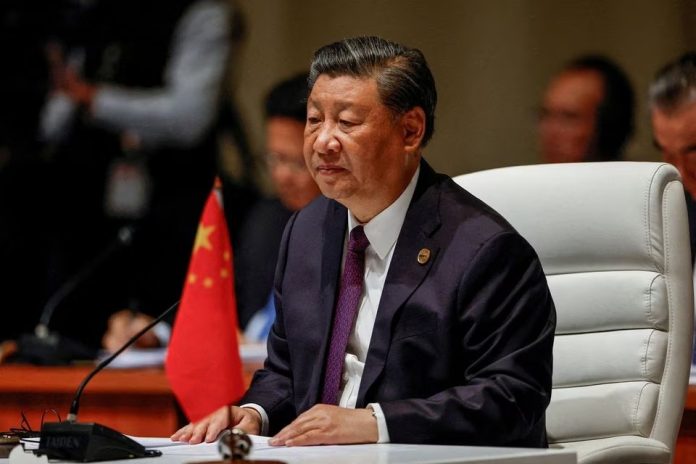Chinese President Xi Jinping’s recent absences from the G20 and ASEAN summits have drawn widespread attention. Additionally, there have been reports of ongoing arrests or disciplinary actions against senior military officers in the People’s Republic of China (PRC). The crackdown has hit several high-ranking officials within the People’s Liberation Army’s (PLA) Rocket Force, as well as the current and former Defense Ministers and executives from defense industry companies. Some sources suggest that Xi’s unusual behavior and his crackdown on the Rocket Force are related to ancient Chinese predictions of a coup and assassination that Xi Jinping believes he may face.
Previously, media reports suggested that the issues within the Rocket Force were related to corruption or leaks of classified information. Other reports suggested that there had been plots against Xi Jinping by some Rocket Force officers who privately opposed an attack on Taiwan. Such reports all indicate a problem with the political loyalty of the individuals whom Xi Jinping once promoted.
Xi Jinping’s Secret Concerns?
However, the latest information reveals that these explanations are just some of the surface reasons the authorities have to give out to justify the purges. These reports state further that the real and unusual underlying reason for the purges involves a “concern” that Xi Jinping harbors and doesn’t want to reveal.
WikiLeaks has previously revealed that Xi Jinping believes in Chinese traditional qigong and supernatural forces. These also encompass various forms of prophecy.
A reliable source of mine also revealed to me that, despite Xi Jinping’s outward promotion of atheism, he has a strong belief in ancient Chinese prophecies. In particular, my source tells me that Xi is taken with prophecies predicting palace coups and assassinations.
Xi allegedly fears that such prophecies might come true, resulting in his death while in office. As a result, my source says, Xi has taken extensive precautions. The recent crackdown on the Rocket Force is related to two of the most famous prophecies in this context.
‘A Soldier Carries a Bow’
One of the prophecies apparently troubling Xi comes from an ancient Chinese book called the Tui Bei Tu (推背图). This text dates back to the Tang Dynasty, more than 1300 years ago. Many of the predictions in this book have already come true, which has had a significant impact on Chinese history.
The prophecy in question comes in the form of a poem that goes with the 46th image in the text. The poem reads:
A soldier carries a bow,
Saying only, ‘I am the old man with white hair.’
In the east gate, a golden sword lies hidden;
A brave warrior enters the imperial palace from the rear gate.
Many interpret this prophecy as a sign that Xi Jinping will face a military coup, being overthrown by soldiers.
According to my source, Xi Jinping believes that the “soldier with a bow” mentioned in this poem corresponds to the Rocket Force.
In ancient times, bows and arrows were long-range weapons used to kill opponents from a distance. Today, these long-range weapons are represented by missiles. Xi Jinping is said to believe that within the Rocket Force, which controls missiles, there may be individuals who pose a potential threat to him and wish to harm him.
The Death of a White-Feathered Bird
Another famous prophecy is from a Chinese folk prophecy book called The Iron Plate.
The final image in this book is quite simple. There are four black birds flying over a gap between two mountains. However, a white bird crashes and dies halfway up the mountain. The bird splatters blood on the cliffs and plummets downward.
There is a sentence below the image: “The white-feathered bird is killed on this side of the mountain.”
Some say that the four black birds represent the first four leaders of the Chinese Communist Party (CCP): Mao Zedong, Deng Xiaoping, Jiang Zemin, and Hu Jintao. The fifth, white-feathered bird represents Xi Jinping.
This interpretation comes from the Chinese character for Xi’s surname, “習.” The upper part of the word Xi is xu (羽), which means “feathers.”
The lower part of the word xi is bai (白), which means “white.” So, when one separates the elements of the character for Xi’s surname, it means “white feathers.” Therefore, the white-feathered bird being killed on this side of the mountain could symbolize Xi Jinping’s fate.
The reason why the white bird crashes into the mountain can also be that it has been shot by an arrow and cannot fly anymore.
Mao Zedong and His ‘8341’ Army
The two prophecies above are both very old, but they have suddenly become very hot topics again among the Chinese people. I was told that Xi Jinping believes in them too, and that that was the fundamental reason why he lashed out against the Rocket Force.
This is not at all as far-fetched as it sounds. In fact, China’s communist leaders have been quite superstitious themselves, despite discouraging superstition among the general population.
For example, Mao Zedong named his central guard unit the “8341.” Why “8341?”







































